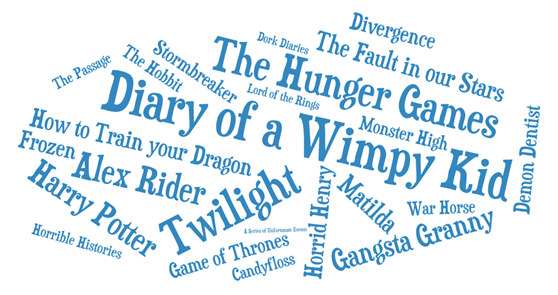
Some favourite books mentioned by those surveyed.
In their fifth annual survey of 32,000 children and young people aged between eight and 18, the National Literacy Trust found enjoyment of reading and frequency of reading are both at their highest levels for nine years. This follows a series of major campaigns and initiatives including:
which have combined with the advocacy of a succession of powerful Children’s Laureates to create momentum to encourage children to read more from a young age.
Children and young people who read daily outside class are five times more likely to read above the expected level for their age compared with young people who never read outside class.
Some key findings from the research, Children’s and Young People’s Reading in 2014, are:
The gender gap is still a marked issue:
The saddest statistic in my mind is the fact that nearly one child in four thinks their parents don’t care if they read.
The research shows there is still more to do to raise awareness among parents of how important their engagement is for their child’s literacy development, particularly among the most disadvantaged children. In the research, one child in four (24.3 per cent) surveyed agreed with the statement “my parents don’t care if I spend any time reading”. This increases sharply among pupils who receive free school meals with almost one third (31.5 per cent) agreeing with the statement, compared to 23 per cent of pupils who do not receive free school meals.
Parental engagement with a child’s literacy development is a key contributor to their success. Children who receive free school meals tend to have lower literacy attainment than their peers, pointing to an even greater need for parents in this demographic to encourage their children to read, and to act as reading role models for their children.